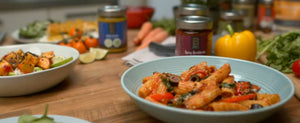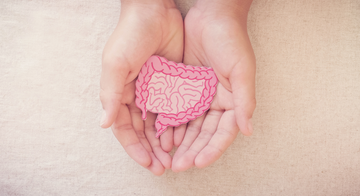
Then you have come to the right place! If you have started to panic, there is no need to!
My Story
In November 2015, my doctor told me I have IBS. I had thought about it before, had paid for expensive and (since found out, unreliable) food intolerance tests and taken over the counter remedies for my symptoms, but the flare ups were getting worse and more frequent.
When I got the diagnosis, my doctor recommended following the FODMAP diet and gave me some tablets to take regularly. As soon as I got home I did what most of us do and went straight to the internet to research about IBS, FODMAP, good and bad foods for me etc… and yes I started to panic. I found IBS isn’t curable, read about the enormous list of foods to avoid, it seemed from all the different forums that everyone had slightly different symptoms and severities, so how do I know what they tried will work for me?
In one way I was thankful I finally had a diagnosis for my terrible cramps, bloating, noisy gas, and uncomfortable and changing bowel movements. However I was also now worried that I’d never be able to be in full control of my health, I’d be miserable for having to cut out so many foods and alcohol, I was relying on these tablets my doctor prescribed to be some sort of miracle cure (which I knew deep down they weren’t) and eating out with friends and family would never be a fun experience again.
After only 6 months since diagnosis, life had started to get back to normal and still eat out a lot and I have found a way to continue to enjoy food. Had I have been referred to a Registered Dietician (or even just understood I needed the help of one to follow the Low FODMAP Diet) then 6 months would have been more like 3-4!
A long time ago I read Marissa Peer’s book ‘How to be thin’ and one of the many points she made that has stuck with me, is about associating certain foods with pain. In her book she was referring to things like sugar, chocolate, cake etc, but it works with anything. I have now associated garlic, onion and other high FODMAP ingredients that cause my digestive discomfort with that pain and so it no longer bothers me not to have it. I will still look at menus and find dishes like garlic prawns, french onion soup and apple pie appealing, but another dish soon overshadows it, that sounds yummy and won’t cause me bowel discomfort!
Yes, it can still be difficult to find food that’s quick and easy to cook after work that won’t upset my IBS, but that’s why I have created Bay’s Kitchen – so you don’t have to go through that too! So there’s no need to panic, there are millions of people out there with IBS and other digestive disorders who have all found their own ways to deal with it and live a much happier lives – how do I know? I’m speaking from personal experience! And I know lots of others who feel exactly the same!
The Diagnosis
Whilst Irritable Bowel Syndrome (IBS) still can’t be officially diagnosed through tests, it is diagnosed through a process of elimination and presence of symptoms. Doctors will often start with blood tests and routine checks to check for all manner of things which could be causing your symptoms, including dairy allergy and coeliac disease.
The main/most obvious difference between IBS and Inflammatory Bowel Disease (IBD) is when you have IBD you will usually find blood in your stool. Once all these diseases and other conditions have been ruled out, and you are diagnosed with IBS your doctor will often discuss medication options to help control/relieve the symptoms and also often discuss trying the Low FODMAP Diet. Do make sure you see a medical professional and don’t try to diagnose it yourself and if you do follow the Low FODMAP Diet, ensure it’s due to a recommendation from a health professional and ideally under the guidance of a Registered Dietician.
The Low FODMAP Diet has been scientifically proven to reduce, and in many cases even eliminate, symptoms in 75% of those who try it. The diet is becoming ever more well known in the UK, with major supermarkets now beginning to list FODMAP Friendly Certified foods!
Being diagnosed with IBS can be very hard. It’s a lifelong condition with no cure and no real physical signs of suffering, so when you do have a flare up no one knows unless you tell them. Even then, because there are no physical signs you can often feel like they don’t believe you. But don’t worry, 20% of the population suffer with IBS, so rest assured, you’re not alone in these feelings! And you’ll never be too far away from someone feeling exactly the same as you!
Find a Registered Dietician
Whether your GP advises the Low FODMAP Diet or not, your diet will play a huge role in your IBS symptoms. Therefore, it’s worth finding an IBS Trained Dietician to work with. You might be lucky and find one locally to you to meet with, but many dieticians now work remotely and hold video meetings with their clients.
Talk To Your Friends & Family
1 in 5 people suffer from IBS! And many more suffer with other similar digestive conditions like SIBO, IBD, Endometriosis etc. So you are bound to find people close to you who suffer with similar symptoms, or at the very least, know someone who does. Opening up about your condition and symptoms relieves so much pressure, and your family and friends will be there to listen and want to help! A problem shared is a problem halved, as they say!
Buy A Food & Symptom Dairy
Your dietician will most likely ask you to fill one of these out, so whilst you are researching for the right dietician and waiting for your appointment, get started on your diary. It’s not just food that affects our symptoms, it’s medication, stress, lack of sleep and more, so it’s important to write it all down so you can get the full picture. We have created our Low FODMAP Food & Symptom Diary to help you do just that! You can purchase it here!
Understand The Importance Of Sleep & Exercise
As I have mentioned, it’s not just the food you eat which affects your symptoms. Even just looking at a healthy lifestyle, sleep and exercise are important components, but they matter even more when you suffer with IBS.
Getting quality sleep will help to reduce your flareups. It gives your body proper time to relax, digest the days food and you will wake up feeling so much more refreshed and less stressed after a good night sleep. Exercise is also important, and whilst it might not feel like it, it does help with IBS! You don’t have to go crazy and high impact, just regular walking, swimming or yoga are great forms of exercise for those with IBS.
Remove As Much Stress From Your Life As Possible
Stress is one of the biggest triggers of flareups – a severe episode of stress can actually cause you to start suffering with IBS in the first place! So it is vitally important to try to keep your stress under control and to a minimum.
Heard of the phrase ‘butterflies in my tummy’? There is a true connection between your brain and your gut – if you’re feeling anxious, you are likely to feel it in your gut! So it’s no wonder, stress causes gut symptoms!
Try to find ways you can relax, whether that’s doing more reading rather than TV watching, turning your phone off an hour before you go to bed, creating a routine for your week, so you don’t get stressed when you can’t fit everything in.
If you are recommended to start following a Low FODMAP Diet, hopefully with the help of a Registered Dietician, then the below list should really help you on your way…
Low FODMAP Food & Symptom Dairy
Everybody reacts differently to different foods, medications, stress, the list goes on! So whilst the Low FODMAP Diet may help a lot of people reduce or eliminate their symptoms, everyone manages to reintroduce different portion sizes of different foods and everyone will have different trigger points. To identify what triggers your symptoms, use our Low FODMAP Food & Symptom Diary. You can purchase it via our shop!
Low FODMAP Foods by Bay's Kitchen
We sell certified Low FODMAP foods which are perfect for all stages of the Low FODMAP Diet! There’s no onion, garlic or other high FODMAP nasties! They are also all Gluten Free certified and our sauces are all vegan approved too. You can purchase them in our shop!
Low FODMAP Recipes by Bay's Kitchen
We have a wide range of Low FODMAP Recipes on our website, suitable for all stages of the Low FODMAP Diet! Many of them use our sauces, which you can buy from our online shop. They are all Low FODMAP, Gluten Free and many are vegetarian or vegan too! View recipes.
FODMarket
FODMarket is a UK online supermarket for Low FODMAP Foods. It has a great variety, including our sauces! Not all products are certified so please check the packaging.
Top UK Resources
We have written this blog article to provide guidance and links to some of the top resources for when you are starting the Low FODMAP Diet. The key one is the Monash University App – this app has the most comprehensive food list which is super useful. I still use this every week! Read the article.
Fodmap Help
This is another page on our website and it is full of really helpful resources, like support groups, the best cookbooks, blogs and more! Head to the page.
We really hope this post has helped you to stop panicking and start thinking about how to take back control of your IBS and improve your quality of life.
If you would like to learn more about the Low FODMAP Diet then click here. If you are a little confused about what FODMAPs are then check out our page here.
You are also always welcome to contact us anytime for advice & support!
Written by Bay Burdett, Founder & CEO of Bay’s Kitchen.
Copyright Bay’s Kitchen. Please do not reprint without permission.
Related Articles
How To Restore Balance & Rejuvenate Your Gut Health
Introducing Nutrition & Health Specialists: Uniquely Created U
6 Relaxation Techniques To Ease Your IBS Symptoms
Popup
Use this popup to embed a mailing list sign up form. Alternatively use it as a simple call to action with a link to a product or a page.
Age verification
By clicking enter you are verifying that you are old enough to consume alcohol.




